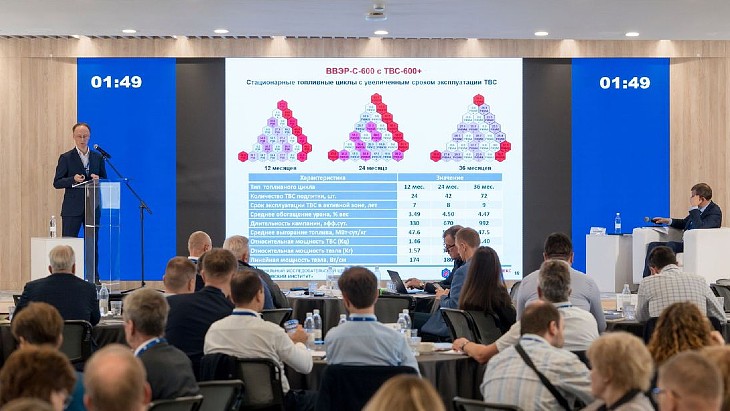Yuri Olenin, Chairman of Rosatom's fuel division TVEL, told the biennial conference in Sochi, Nuclear fuel of the new generation for nuclear power plants - development results, operating experience and development directions that the main tasks facing the industry were: reducing production costs without compromising quality; increasing the length of time nuclear fuel can be used before needing to be replaced; minimising the volume of radioactive waste; the introduction of accident-tolerant fuel and attracting more young people and university research into the field.
Alexander Ugryumov, senior vice president for scientific and technical activities of TVEL, said that to improve the efficiency of VVER reactors it was important to introduce fuel enriched above the standard 5%: "Increasing uranium enrichment to 6%, and in the future to 7-8%, is a global trend and a task that key market players are working on. This will allow us to increase the duration of the fuel campaign from 18 to 24 months, but at the same time maintain the number of fresh fuel assemblies during fuel reloading (which is important for the economic effect), and most importantly, to form fuel loads with low neutron leakage to the reactor vessel and internal devices to ensure an extension of their operational life beyond the design 60 years. In addition, highly enriched fuel can also be used in the event of an increase in the thermal power of existing VVER-1000 reactors to 107%, which will provide the opportunity to increase the economic effect. JSC TVEL has already prepared an industry solution for conducting pilot industrial operation of fuel enriched to more than 5%, and we hope that after it is reviewed by Rosatom, we will begin preparatory work for the pilot industrial operation of such fuel."
In terms of a "balanced" fuel cycle, he highlighted the introduction of uranium-plutonium REMIX (Regenerated Mixture) fuel for VVER reactors and the MOX (mixed oxide) fuel for VVERs with a higher plutonium content which is being developed and tested in a research reactor and which will be used for the new VVER-S/600 reactor. MOX fuel assemblies containing minor actinides were also being loaded into the BN-800 fast reactor, with plans to increase the minor actinides content and also ensure the operation of such fuel from the start of the proposed BN-1200 reactor.
He said that TVEL was now a company focusing on the entire nuclear fuel cycle, including the backend and the processing of irradiated materials.
Dmitry Anufriev, chief technologist of Rosenergoatom, said that to hit the domestic goal of increasing nuclear energy's share to 25% by 2045, improved efficiencies relating to nuclear fuel were important, alongside new power units and lifetime operating extensions. One of the changes would be to extend the time between fuel loading to 18 months, from 12 months, at all VVER-1200 units, and he said that after receiving approval from regulator Rostekhnadzor, it was planned to test operation of Balakovo unit 4 at a thermal power of 107% of its nominal capacity, up from 104%.
The event, held last week, was attended by about 150 people from the Russian nuclear industry, and outlined the measures being taken towards the goal of moving towards a closed fuel cycle.
Why aim for a balanced fuel cycle?
Mikhail Baryshnikov, Director of Innovations and Technologies, for nuclear fuel cycle company Tenex, says that used fuel contains valuable materials that "can be recovered and reused, reducing both risks and environmental impact - reprocessing, recycling, and waste reduction are key strategies to ensure the nuclear industry remains sustainable and efficient".
"Using advanced technologies like advanced radiochemistry, remote fuel fabrication, and fast neutron reactors, Rosatom maximises the use of recovered uranium and plutonium, transmutes minor actinides, and reduces the volume of radioactive waste by over 20 times. The benefits for nuclear power plant operators and the energy system overall include: optimised nuclear fuel cycles, avoiding the need for deep geological disposal, and alignment with UN Sustainable Development Goals and the EU Green Taxonomy," he said.







_15863.jpg)







